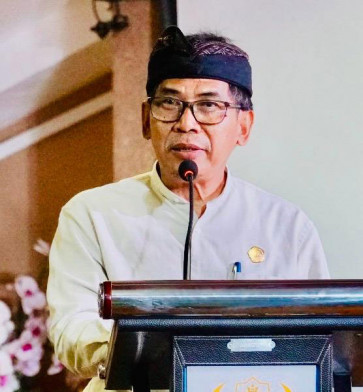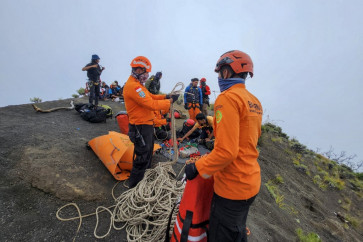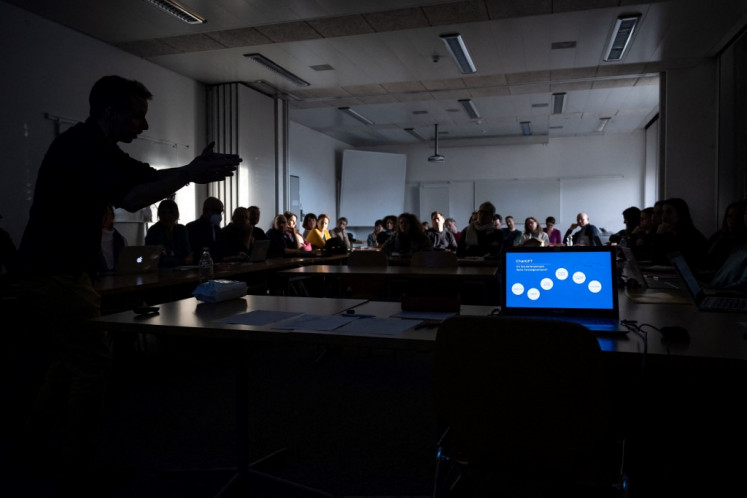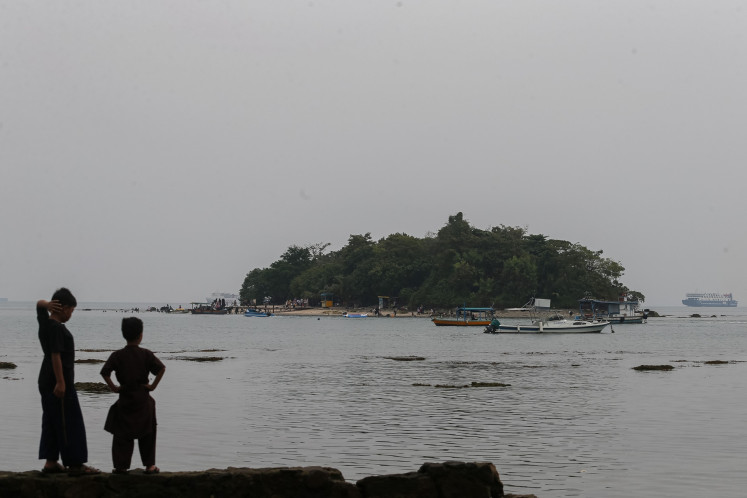Popular Reads
Top Results
Can't find what you're looking for?
View all search resultsPopular Reads
Top Results
Can't find what you're looking for?
View all search resultsHappy trails with halal apps and guides
Change text size
Gift Premium Articles
to Anyone
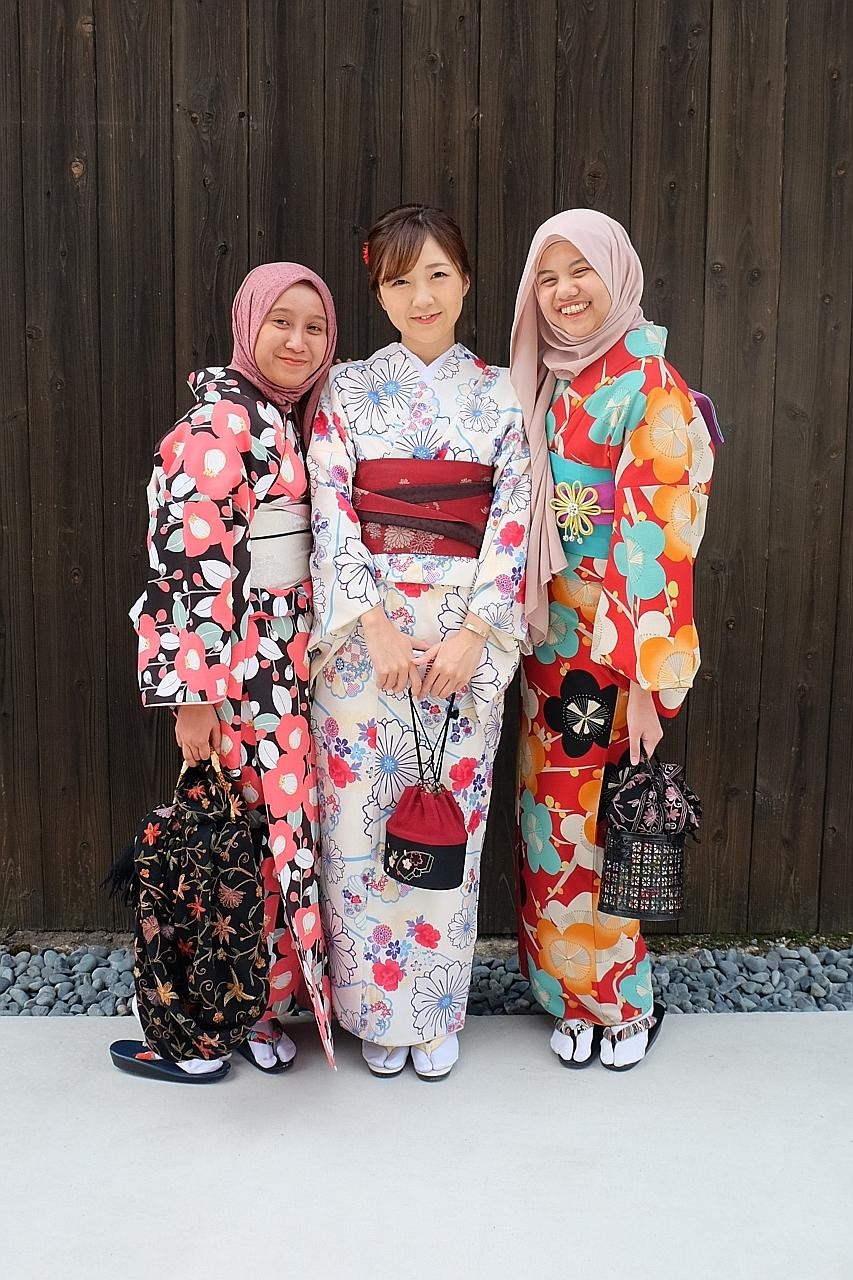 Halal Navi project manager Aida Nur Ariza (left) and her colleague, Ms Nur Aqalili Azizan (far left), in Kyoto, Japan. While Halal Navi's focus is still on Japan, users have also begun to provide tips on halal restaurants in other countries such as South Korea, Thailand and Germany. (The Straits Times/Asia News Network/Halal Navi)
Halal Navi project manager Aida Nur Ariza (left) and her colleague, Ms Nur Aqalili Azizan (far left), in Kyoto, Japan. While Halal Navi's focus is still on Japan, users have also begun to provide tips on halal restaurants in other countries such as South Korea, Thailand and Germany. (The Straits Times/Asia News Network/Halal Navi)
I
t wasn't the first time that Ms Anis Ibrahim had performed her daily prayers while on the road - but it was certainly an unusual experience to pray inside a tiny bunk on a swaying Russian train.
The train was en route from St Petersburg as part of her overland journey from Russia to Kuala Lumpur in 2012. No one batted an eyelid, although she recalled noticing a tourist taking a video of her praying in a hostel bunk in New Zealand. "I guess this was the first time she had seen a Muslim pray!"
As a seasoned traveller, Ms Anis, who is in her 40s, has become adept at merging her Muslim obligations with wanderlust. She obeys the religion's requirements on halal food, daily prayers and the Ramadan fast, whether she is on long train journeys or hikes, such as the eight-day one on the 150km West Highland Way in Scotland in 2016.
"To me, travel is a way of appreciating life, and that has made me closer to God," she said.
The number of Muslim travellers like Ms Anis is growing rapidly, presenting a new niche for small businesses that have sprung up to serve their needs, from Muslim tours to halal apps and Web guides, largely set up by young entrepreneurs who are well-travelled and tech-savvy.
A survey released last October by research group J. Walter Thompson Intelligence noted that the global Muslim consumer market - estimated to be worth US$1.9 trillion (S$2.6 trillion) - has been the subject of increased focus over the last few years.
Called The New Muslimah: South-east Asia Focus, the survey of young Muslim women found them to be increasingly cosmopolitan in their outlook, while more religiously observant than their elders - both "more Islamic and more global" at the same time.
Around one-third of the women aged 18 to 39 surveyed in Malaysia and Indonesia said they travelled abroad annually - with over 70 per cent choosing their destination based on the availability of halal food and accommodation.
While the study focused on Muslim women, the same holds true for Muslim men in South-east Asia.
Read also: Most ethical travel hotel brands of 2017 revealed in report
FILLING THE GAP
Malaysian-founded Halal Navi and Singapore-based website Have Halal Will Travel both operate smartphone apps and digital guidebooks for the Muslim traveller. Both were created and are run by young Muslims aged below 30 who had found it difficult to navigate the road and their faith at the same time.
Halal Navi started in 2014 and Have Halal Will Travel a year later. Both fill the information gap on halal eateries, places to pray, Muslim-friendly accommodation and halal grocery stores in a light-hearted and fun manner.
Halal Navi was launched by Malaysian IT engineer Rafiq Rahim, who had to rely heavily on tips from friends on getting halal food while studying and working in Tokyo.
"It was especially difficult when we went to places like Hokkaido, where we didn't know anyone," said Ms Aida Nur Ariza, who was Mr Rafiq's colleague in Tokyo, and now the project manager of Halal Navi.Mr Rafiq suggested to their Japanese employer that a smartphone app be set up to enable Muslims in Japan to share tips, thus creating a crowd-sourced guide. The app took off in 2014 and a year later, the team moved to Kuala Lumpur. Run by Malaysians, it continues to be funded by several Japanese investors.
"Halal Navi is an entirely community-based service, much like getting tips from friends," said Ms Aida.
The eateries are listed as halal-certified, pork-free or vegetarian, and users can also provide information on whether they serve alcohol or non-halal dishes. To be listed, the restaurant must, at the very least, serve a few meat-free dishes or seafood dishes cooked without alcohol.
Listings are user-verified. Each listing will show verifications about its status, and users make their own decisions on whether to dine there.
Ms Aida said different types of restaurants are listed as people have different religious standards. It now lists over 800 restaurants in Japan, alongside halal grocers and prayer rooms.
While the focus is still on Japan, users have also begun to provide tips on halal restaurants in other countries such as South Korea, Thailand and Germany.
More than 80,000 users have registered to use the app, and it also has 95,000 Facebook followers and more than two million views a month. Halal Navi is now working with tourism bodies in Japan to create promotional content that appeals to the tech-savvy young.
"The business potential is huge as more countries want to welcome Muslim tourists, not just Japan," said Ms Aida.
Have Halal Will Travel has also been greeted with enthusiastic response, with a reach of 8.5 million a month, said one of its founders, Mr Mikhail Goh, 28. Most are from Malaysia, Indonesia and Singapore.The idea for a halal guide was sparked after its founders found it difficult to find halal food in South Korea while they were on a student exchange programme in 2014.
Have Halal Will Travel is run by Mr Goh and his wife, Tengku Suzana Tengku Abdul Kadir, 27, both Muslims, and their non-Muslim friend, Ms Elaine Tee, 27.
It now covers four countries, providing information on halal restaurants, places to pray, Muslim-friendly accommodation and other destination tips. More than 1,000 restaurants are listed, ranging from halal-certified to Muslim-owned to pork-free or vegetarian. The site does not list those that serve pork.
"We provide information so that people can make an informed choice, but we don't impose our choices," said Mr Goh.
Have Halal Will Travel also creates content for several tourism boards and companies such as AirAsia on promoting travel to Muslims.
Read also: Travel app makes exploring Cirebon easier
TRAVEL AGENCIES COME ABOARD
Traditional travel agencies have also begun to adapt to the change in the scene through the setting up of Muslim tours, where travel is combined with religious needs and cultural interest.
Ms Hasleeza Hamid from the Muslim travel division of Sedunia Travel said this service was set up in 2016 because of demand from the firm's predominantly Malaysian Muslim clientele.
Muslim tours are identical to regular tours but with halal-certified meals and prayer times observed. Islamic cultural sights are also often included to enable visitors to see how Islam is practised abroad.
"We have been running tours for the Malaysian Muslim market since 1976 but in recent years, many prefer to have meals with halal certification stated in black and white, rather than just pork-free meals," she said.
These tours now make up 20 to 30 per cent of Sedunia Travel's business and are particularly popular with families travelling in large groups or with young children.Farther afield, well-heeled investors have also launched luxury halal resorts and retreats, and Muslim holiday homes. According to the State of the Global Islamic Economy Report 2017/18, produced by Thomson Reuters, Muslims worldwide spent US$169 billion on travel in 2016, excluding pilgrimages to Mecca, and this figure continues to grow.
In Muslim travel, food and prayer needs generally rank as the most important.
Ms Anis, who has been travelling for the better part of two decades, does not neglect her religious practices but stays flexible and adaptable. When it comes to food, experience tells her that halal eateries can often be found near a mosque, but if she can't find one, she opts for vegetarian meals or seafood. When all options run out, there are always instant noodles.
TRAVEL FOR THE SOUL
These new businesses are confident the market will grow.
"The demand has always been there, and new services like (Have Halal Will Travel) are also acting as catalysts to grow the market," Mr Goh said.
Promoting travel has become a mission for the Have Halal Will Travel team. He added: "Food is such a great way for people to get together. We would like to bridge this by telling people where to find halal options for local food so they can travel and eat together, Muslims and non-Muslims. Travel can be a force for peace."


